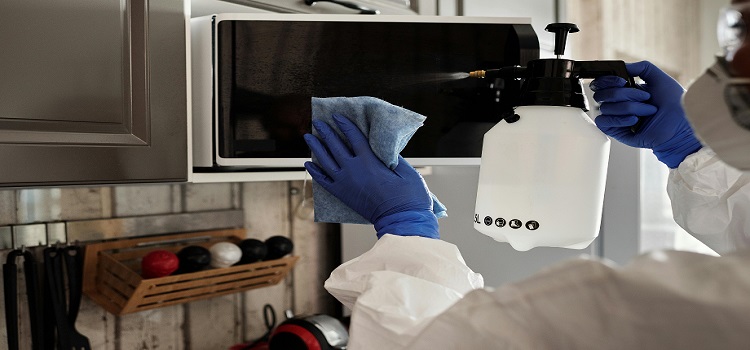As an Amazon Associate I earn from qualifying purchases.
Introduction:
Discovering rust in your microwave oven can be concerning, as it may affect the appliance’s performance and safety. Rust can develop due to various factors, including moisture accumulation and exposure to acidic or corrosive substances. In this guide, we’ll explore the causes of rust in microwave ovens, its potential implications, and steps you can take to address and prevent rust formation for optimal appliance maintenance.

Causes of Rust in Microwave Oven:
Rust in a microwave oven can occur due to several reasons:
- Moisture Exposure: Condensation from steam or food splatters can accumulate inside the microwave, promoting rust formation over time.
- Poor Ventilation: Inadequate ventilation can trap moisture inside the microwave, creating an environment conducive to rust development.
- Spills and Splatters: Food spills containing acidic or corrosive substances can corrode the interior surfaces of the microwave, leading to rust spots.
- Scratches or Damage: Scratches or dents in the microwave’s interior coating can compromise its protective layer, making it more susceptible to rusting.
Implications of Rust in Microwave Oven:
Rust in a microwave oven can have several implications:
- Aesthetic Concerns: Rust spots can detract from the appearance of the microwave, giving it a worn or unkempt look.
- Safety Risks: Rust can compromise the structural integrity of the microwave’s interior, potentially leading to safety hazards if left unchecked.
- Food Contamination: Rust particles may contaminate food during the cooking process, posing health risks to consumers.
Prevention and Maintenance Techniques:
To prevent rust formation and maintain your microwave oven’s integrity, consider the following techniques:
- Clean Spills Promptly: Wipe down the interior surfaces of the microwave regularly to remove food spills and splatters promptly.
- Use Microwave-Safe Containers: Avoid using containers made of materials prone to rust or corrosion, such as metal or certain types of ceramics.
- Ensure Proper Ventilation: Ensure adequate ventilation around the microwave to allow moisture to escape, reducing the risk of rust formation.
- Inspect for Damage: Regularly inspect the interior surfaces of the microwave for signs of scratches, dents, or other damage that may compromise its protective coating.
- Dry Interior Thoroughly: After cleaning or cooking, ensure the interior of the microwave is thoroughly dried to prevent moisture accumulation.
FAQs:
- Can I still use a microwave oven with rust spots inside?
- It’s not recommended to use a microwave oven with rust spots, as it may compromise food safety and appliance performance.
- How can I remove rust from the interior of my microwave oven?
- There are commercial rust removers available, but it’s best to consult the manufacturer’s instructions or a professional technician for guidance on safe removal methods.
- Is it safe to repaint the interior of a microwave oven to cover rust spots?
- Repainting the interior of a microwave oven is not recommended, as it may introduce harmful chemicals or affect the appliance’s functionality.
- Can rust in a microwave oven cause sparks or fires?
- Rust spots can potentially cause arcing or sparks, posing fire hazards. It’s essential to address rust issues promptly to prevent such incidents.
- What should I do if I notice rust forming in my microwave oven?
- If you notice rust forming, discontinue use of the microwave oven and consult the manufacturer’s instructions or a professional technician for guidance on addressing the issue.
- How can I prevent moisture buildup in my microwave oven?
- Ensure proper ventilation, avoid covering food tightly during cooking, and promptly wipe down any moisture or condensation that accumulates inside the microwave.
- Are there any aftermarket coatings or liners available to prevent rust in microwave ovens?
- While some aftermarket products claim to provide additional protection against rust, it’s essential to research thoroughly and consult the manufacturer before using such products to avoid voiding warranty or causing damage.
- Can rust in a microwave oven affect its cooking performance?
- Rust spots may interfere with the microwave’s ability to generate and distribute heat evenly, potentially affecting cooking performance and food quality.
- How often should I inspect my microwave oven for rust?
- It’s a good idea to inspect the interior surfaces of the microwave regularly, such as during routine cleaning, to catch any signs of rust early and address them promptly.
- Are there any DIY methods for preventing rust in a microwave oven?
- While regular cleaning and maintenance can help prevent rust formation, there are no foolproof DIY methods for preventing rust in a microwave oven. It’s essential to follow proper care guidelines and address any issues promptly.
Conclusion:
Rust in a microwave oven can be a cause for concern, as it may affect both the appliance’s performance and safety. By understanding the causes of rust formation and implementing preventive maintenance techniques, you can prolong your microwave oven’s lifespan and ensure safe and efficient operation. Regular inspection, prompt cleaning, and proper ventilation are key to addressing rust issues and maintaining your microwave oven in optimal condition for years to come.
As an Amazon Associate I earn from qualifying purchases.
Leave a Reply